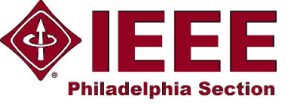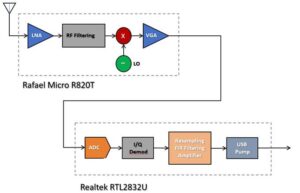Mini-Workshop on Software Defined Radio Using the RTL-SDR
Sponsored by the IEEE Philadelphia Section and IEEE-USA.
 The software defined radio (SDR) is the modern evolution of the hardware approach to radio communications that had dominated recent technology. Discrete components formerly implemented tuned circuits, amplifiers, oscillators, mixers and detectors to provide analog modulation and demodulation. Even though vacuum tube electronics gave way to transistors and integrated circuits, the components of the radio remained discrete. However, the advent of digital modulation and application specific integrated circuits has resulted in an SDR in which all but the front end of the receiver and the back end of the transmitter could be accomplished with digital signal processing software. This Mini-Workshop presents the progression of the configuration and the availability of inexpensive SDRs that, while only capable of reception, can still provide an experience in wireless technology.
The software defined radio (SDR) is the modern evolution of the hardware approach to radio communications that had dominated recent technology. Discrete components formerly implemented tuned circuits, amplifiers, oscillators, mixers and detectors to provide analog modulation and demodulation. Even though vacuum tube electronics gave way to transistors and integrated circuits, the components of the radio remained discrete. However, the advent of digital modulation and application specific integrated circuits has resulted in an SDR in which all but the front end of the receiver and the back end of the transmitter could be accomplished with digital signal processing software. This Mini-Workshop presents the progression of the configuration and the availability of inexpensive SDRs that, while only capable of reception, can still provide an experience in wireless technology.
Mini-Workshop topics include:
Signals and Systems
I/Q Signals and the SDR
RTl-SDR Configuration
RTL-SDR Applications
Analog and Digital Signal Spectra
Additional Topics: Antenna Construction, RTL-SDR and GNU Radio, Resources and References
Mini-Workshop Materials
Mini-Workshop PowerPoints (pdf) are available. Send a request to silage@temple.edu
Xilinx Zynq System-on-Chip Design Workshop 
Sponsored by the IEEE Philadelphia Section and IEEE-USA.
 The Xilinx Zynq System-on-Chip (SoC) provides a dual ARM Cortex-A9 32-bit processor with floating point, DRAM and Flash controllers, peripheral interfaces, an AMBA interconnection bus and programmable logic with RAM and DSP om a single device. The Xilinx Vivado HLx Webpack suite provides the hardware and software design environment for the configuration and C language programming of the Zynq device. The Digilent Zybo board utilizes the Zynq device and provides peripherals, DRAM, I/O ports, audio codec and Ethernet and USB ports.
The Xilinx Zynq System-on-Chip (SoC) provides a dual ARM Cortex-A9 32-bit processor with floating point, DRAM and Flash controllers, peripheral interfaces, an AMBA interconnection bus and programmable logic with RAM and DSP om a single device. The Xilinx Vivado HLx Webpack suite provides the hardware and software design environment for the configuration and C language programming of the Zynq device. The Digilent Zybo board utilizes the Zynq device and provides peripherals, DRAM, I/O ports, audio codec and Ethernet and USB ports.
The Workshop introduces the participants to the design process for the SoC using Vivado HLx and the Zybo board. The participants will perform han ds-on designs of process control systems with actuator and display and FIR digital filtering with ADC and DAC serial peripheral interface (SPI) modules. The Workshop utilizes The Zynq Book Tutorial and considers AMBA bus AXI-lite interfacing and software timers.
ds-on designs of process control systems with actuator and display and FIR digital filtering with ADC and DAC serial peripheral interface (SPI) modules. The Workshop utilizes The Zynq Book Tutorial and considers AMBA bus AXI-lite interfacing and software timers.
Workshop materials:
Installation of Xilinx Vivado SDK and Zynq Projects (pdf) This is the instruction on how to download and install Xilinx Vivado 2019.1 as C:\Xilinx and the installation of the material listed below.
The_Zynq_Book (pdf) Xilinx Zynq Book reference material. Unzip and store conveniently as Documents\Zynq Book.
The_Zynq_Book_Tutorial (pdf) Xilinx Zynq Book Tutorials used in the Workshop as a reference. Unzip and store conveniently as Documents\Zynq Book.
Zynq_Book_Sources (zip) Zynq Book C language source code for the Tutorials in SDK. Unzip and store the folder as C:\Zynq_Book_Sources
data boards board parts (zip) Unzip and store the subfolders on C:\Xilinx\Vivado\2019.1\data\boards\board_parts
data boards board files (zip) Unzip and store the subfolders on C:\Xilinx\Vivado\2019.1\data\boards\board_files
first_zynq_design (zip) zynq_interrupts (zip) ip_repo (zip) zynq_add_interrupts (zip) led_controller (zip) These are the subfolders for the folder Zynq_Book_Tutorial_Solutions. Unzip each of these subfolders and store as C:\Zynq_Book_Tutorial_Solutions. See the Installation and Workshop PowerPoints for more details.
zybo-z7_rm (pdf) cora_z7_rm (pdf) These are the reference manuals for the Workshop Digilent Zybo board and the continuing education Digilent Cora Z7 board